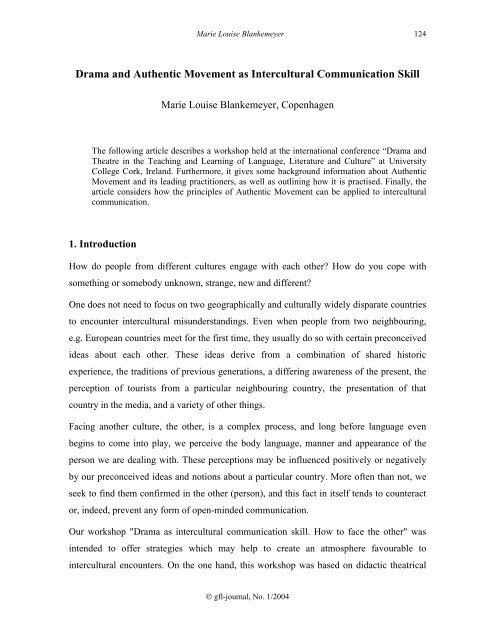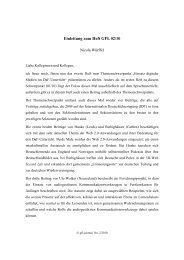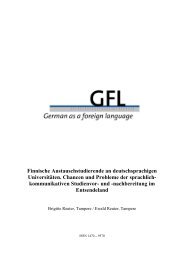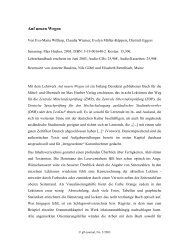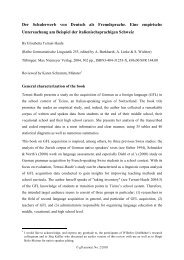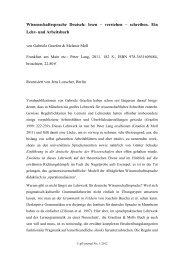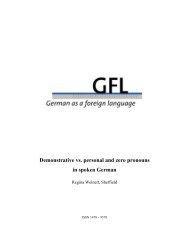Drama and Authentic Movement as Intercultural ... - GFL
Drama and Authentic Movement as Intercultural ... - GFL
Drama and Authentic Movement as Intercultural ... - GFL
You also want an ePaper? Increase the reach of your titles
YUMPU automatically turns print PDFs into web optimized ePapers that Google loves.
Marie Louise Blankemeyer<br />
124<br />
<strong>Drama</strong> <strong>and</strong> <strong>Authentic</strong> <strong>Movement</strong> <strong>as</strong> <strong>Intercultural</strong> Communication Skill<br />
Marie Louise Blankemeyer, Copenhagen<br />
The following article describes a workshop held at the international conference “<strong>Drama</strong> <strong>and</strong><br />
Theatre in the Teaching <strong>and</strong> Learning of Language, Literature <strong>and</strong> Culture” at University<br />
College Cork, Irel<strong>and</strong>. Furthermore, it gives some background information about <strong>Authentic</strong><br />
<strong>Movement</strong> <strong>and</strong> its leading practitioners, <strong>as</strong> well <strong>as</strong> outlining how it is practised. Finally, the<br />
article considers how the principles of <strong>Authentic</strong> <strong>Movement</strong> can be applied to intercultural<br />
communication.<br />
1. Introduction<br />
How do people from different cultures engage with each other? How do you cope with<br />
something or somebody unknown, strange, new <strong>and</strong> different?<br />
One does not need to focus on two geographically <strong>and</strong> culturally widely disparate countries<br />
to encounter intercultural misunderst<strong>and</strong>ings. Even when people from two neighbouring,<br />
e.g. European countries meet for the first time, they usually do so with certain preconceived<br />
ide<strong>as</strong> about each other. These ide<strong>as</strong> derive from a combination of shared historic<br />
experience, the traditions of previous generations, a differing awareness of the present, the<br />
perception of tourists from a particular neighbouring country, the presentation of that<br />
country in the media, <strong>and</strong> a variety of other things.<br />
Facing another culture, the other, is a complex process, <strong>and</strong> long before language even<br />
begins to come into play, we perceive the body language, manner <strong>and</strong> appearance of the<br />
person we are dealing with. These perceptions may be influenced positively or negatively<br />
by our preconceived ide<strong>as</strong> <strong>and</strong> notions about a particular country. More often than not, we<br />
seek to find them confirmed in the other (person), <strong>and</strong> this fact in itself tends to counteract<br />
or, indeed, prevent any form of open-minded communication.<br />
Our workshop "<strong>Drama</strong> <strong>as</strong> intercultural communication skill. How to face the other" w<strong>as</strong><br />
intended to offer strategies which may help to create an atmosphere favourable to<br />
intercultural encounters. On the one h<strong>and</strong>, this workshop w<strong>as</strong> b<strong>as</strong>ed on didactic theatrical<br />
© gfl-journal, No. 1/2004


